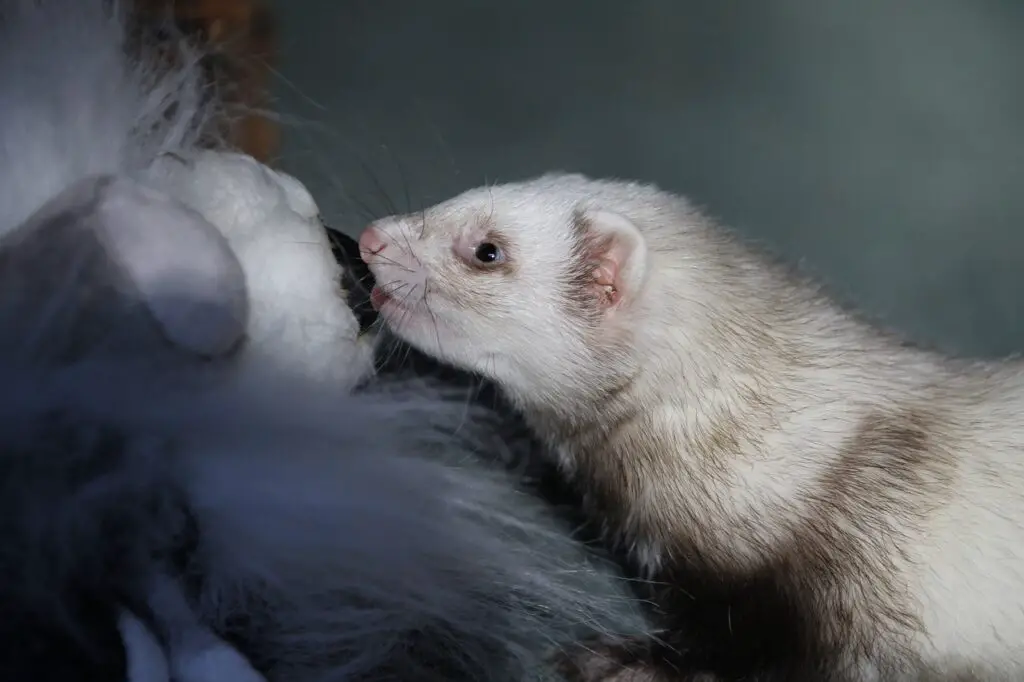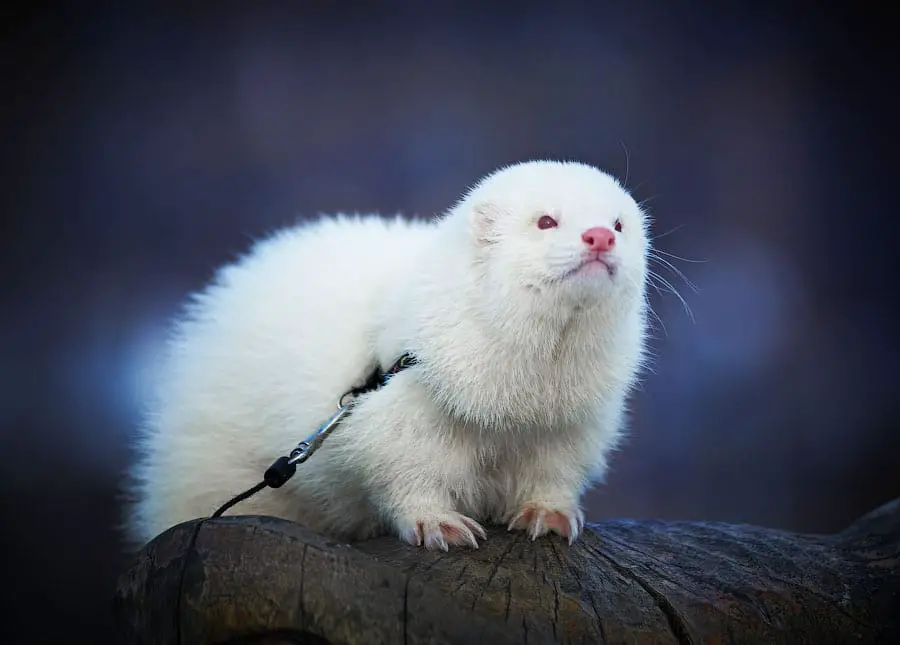Introduction
How Long Do Ferrets Live: Ferrets, those playful and curious members of the mustelid family, have captured the hearts of many as beloved household pets. While their endearing antics and inquisitive nature make them popular companions. In this exploration of the lifespan of these captivating creatures, we will delve into the factors that influence their longevity, the average life expectancy ferrets, and essential tips for ensuring a healthy and happy life for your furry friend. Whether you’re a seasoned ferret owner or contemplating bringing one into your home for the first time, understanding their lifespan is a crucial aspect of responsible ferret care. Throughout this journey, we will unravel the intricate web of factors that contribute to the lifespan of ferrets, shedding light on their unique dietary needs, exercise requirements, and healthcare essentials. We’ll also explore the role of genetics, early socialization, and the quality of care in determining just how long a ferret can live.
As we navigate the world of ferret longevity, we’ll draw upon the experiences of ferret enthusiasts and experts, offering practical insights and advice to help you provide your furry companion with the best possible chance at a long and fulfilling life. Whether you’re seeking to extend the years you spend with your current ferret or preparing to bring a new one into your home it will equip you with the knowledge and tools to foster a strong, lasting bond with these endearing animals. So, if you’re ready to embark on a quest for a deeper understanding of ferret lifespans, their unique characteristics, and the secrets to nurturing a happy and healthy ferret companion, join us as we dive into the captivating world of ferret longevity.
In our exploration of ferret lifespans, we will also touch upon the history of these domesticated yet undeniably wild creatures. Originating from European polecats, ferrets have a storied past as hunters and working animals. Understanding their evolutionary background and how it intersects with their lifespan can provide valuable insights into their needs as modern-day pets. Moreover, we’ll delve into some of the challenges and common health issues that ferrets may face as they age. From dental problems to adrenal disease, it’s important to be aware of these potential issues and how to address them to ensure a longer, healthier life for your ferret. Throughout this journey, we will also celebrate the joys of ferret ownership, from their mischievous playfulness to their affectionate nature.

Can ferrets live as pets?
Ferrets have an inquisitive and playful nature. They can learn to see humans as companions and form a strong bond with their owners. This makes them a popular pet choice because of their sociable and charming character.
Housing: Ferrets need a secure and spacious enclosure, such as a ferret-proofed room or a large cage with multiple levels. They should have ample space to move around and explore.
Diet: Ferrets are obligate carnivores, which means they require a meat-based diet. High-quality ferret kibble or a raw meat diet is recommended. It’s crucial to provide fresh water at all times.
Socialization: Ferrets thrive on social interaction. They should not be left alone for extended periods and benefit from daily playtime and companionship.
Exercise: Regular exercise is essential to keep ferrets physically and mentally stimulated. They enjoy toys, tunnels, and games that challenge their agility.
Grooming: Ferrets have a short, dense coat that requires minimal grooming. Regular nail trimming and dental care are necessary for their health.
Do ferret bites hurt?
It’s worth noting that the ferret’s skin is thicker and tougher than human skin, so when ferrets nip at each other in play, they don’t inflict any real pain. But when they nip at a human, it can hurt.
Ferrets are curious and social animals, and their primary mode of interaction with the world is through their mouths. They use their sharp teeth not only for eating but also for play and exploration. In most cases, ferret bites are not intended to cause harm but are rather a form of communication or a reaction to stimuli.
The level of pain caused by a ferret bite can vary depending on several factors, including the ferret’s age, size, and the force behind the bite. In general, a ferret’s bite can be uncomfortable or even painful, especially when directed at sensitive areas like fingers. Their sharp teeth can pierce the skin, causing puncture wounds and potentially leading to swelling and infection if not properly cleaned and treated.
It’s important to note that ferrets have a strong bite for their size, and their jaws are designed for gripping prey in the wild. While their bites are generally not severe, they should be taken seriously, and precautions should be taken to prevent them.
Ferrets can be trained to have soft mouths through consistent, positive reinforcement training techniques. Rewarding them for gentle behavior and discouraging rough play can be effective.
Do ferrets love owners?
While ferrets are not for everyone, they can make great pets for the right owner. They are affectionate and bond with their owners, quiet for a large part of the day, and there are few pets as playful as ferrets.
Ferrets are inherently social creatures. In the wild, they live in colonies and rely on social interactions for various aspects of their lives, including play, hunting, and grooming. When ferrets are kept as pets, they extend this social behavior to their human companions.
While ferrets do form strong bonds with their human companions and display signs of affection, it’s important to acknowledge that their emotional expressions are different from those of dogs or cats. Ferret affection is often characterized by playfulness, togetherness, and shared experiences rather than overt displays of overt love. They may not snuggle and purr like cats or wag their tails like dogs, but their unique behaviors are their way of saying, “I enjoy your company.”
Ferrets are also highly individual in their personalities. Some may be more demonstrative in their affection, while others are quieter in their displays of love. It’s essential to recognize and appreciate these individual differences.
The joy and companionship they bring into our lives are a testament to the unique and loving nature of these playful creatures. Understanding and appreciating the subtle signs of ferret affection can lead to a rich and rewarding relationship that goes beyond mere words or overt displays of love.
Is ferret a dead sleeper?
When ferrets sleep, something they will enter a very deep sleep, which will make them appear as if they are dead. You can pick them up, move them, talk to them; and they won’t wake up right away. The only sign of life is the slow raising and lowering of their stomach because of their breathing.
Ferrets are known for their intriguing and often amusing sleeping habits, including a behavior sometimes referred to as “dead sleeping.” These captivating creatures seem to sleep so deeply that they can mimic the appearance of lifelessness, leading to questions and concerns from ferret owners and enthusiasts.
Ferrets are crepuscular animals, meaning they are most active during dawn and dusk, but they also need substantial amounts of sleep to maintain their boundless energy levels. On average, ferrets sleep between 14 to 18 hours a day, and they often have several short naps interspersed with periods of wakefulness.
“Dead sleeping” is a term used to describe a phenomenon where ferrets enter into an exceptionally deep and still sleep. During these episodes, ferrets may appear completely limp, unresponsive, and even unbreathing, causing concern among their owners. It’s important to note that ferrets are not actually dead during these deep sleep phases; they are simply in a state of very relaxed slumber.
Like humans and many other animals, ferrets experience rapid eye movement (REM) sleep, which is a phase of deep and restorative rest. During REM sleep, muscles become extremely relaxed, sometimes to the point where they appear limp.
Are ferrets cuddly?
Ferrets may be tiny, but they pack big personalities into small packages. These guys can be extremely loving and cuddly with their humans. Of course, it takes time to form that special friendship.
Ferrets are social animals known for their high energy levels and love of play. Their vivacious nature often includes a playful and mischievous demeanor that can be both endearing and entertaining. These traits might not immediately suggest a cuddly disposition, but ferrets have their own unique way of showing affection.
While ferrets may not express affection in the same way as dogs or cats, they do form strong bonds with their human companions and can be quite cuddly in their own distinctive fashion. Here’s how ferrets often display their affection.
Ferrets are known for shadowing their owners around the house, indicating a strong desire to be close and involved in their activities. Ferrets make a joyful, warbling sound called “dooking” when they are excited or happy, which can be a sign of their affection and contentment.
It’s essential to recognize that ferrets, like people, have distinct personalities. Some ferrets are naturally more affectionate and cuddly than others. The level of cuddliness can be influenced by factors such as early socialization, the ferret’s background and experiences, and its individual disposition.
Are ferrets intelligent?
Matulich outlined all the ways that intelligence in animals is usually measured and ranked ferrets in the most common categories: Ability to Problem Solve: ferrets rank above dogs and cats and some small primates. The weasel family is famously known for their ability to figure out how to get into just about anything.
Problem Solving: Ferrets are natural problem solvers. They can navigate complex mazes, figure out how to open latches, and even locate hidden objects. These skills make them excellent escape artists when they’re determined to explore.
Social Intelligence: Ferrets are highly social animals, and their interactions with other ferrets and humans demonstrate their ability to understand social cues and form bonds. They can learn to recognize their owners, respond to their names, and engage in playful, interactive behaviors.
Adaptability: Ferrets are adaptable creatures. They can adjust their behaviors and strategies based on their environment and circumstances. This adaptability helps them thrive in a range of settings, from homes to farms.
Memory: While not known for their long-term memory, ferrets possess a good memory for their immediate environment and routines. They can quickly learn where to find their food, water, and favorite hiding spots.
Do ferrets love kids?
Lively, curious and fun-loving ferrets make great pets, but they’re not the easiest to handle and can bite if startled, so, they don’t always make good pets for children. Like all pets, ferrets require more looking after than a child can offer and responsibility for any animal’s wellbeing lies with adults.
Ferrets, with their playful and inquisitive nature, can be wonderful companions for children. However, the question of whether ferrets love kids may require a closer look at the dynamics of this unique and often delightful interplay between two very different creatures. In this exploration, we’ll discuss the potential for loving relationships between ferrets and children, the responsibilities involved, and how to foster a harmonious and safe environment for all.
Ferrets are known for their sociable disposition and their ability to form strong bonds with their human companions, including children. These furry creatures often enjoy the energetic and interactive nature of kids, making them a playful and engaging addition to a family.
Children should be taught to handle ferrets gently and with care. Rough or inappropriate handling can cause stress or harm to the ferret. Emphasize the importance of handwashing before and after handling a ferret to prevent the spread of germs.
Are ferrets beginner pets?
Ferrets are a long-term commitment: their lifespan ranges from five to nine years. Never get a ferret if you’re looking for an easy pet. But if you can rise to the challenge, a lot of people think it’s worth it. “They’re so interactive – they want to be with you.
Playful Nature: Ferrets are known for their boundless energy and love of play. They require daily exercise, mental stimulation, and interactive playtime to stay happy and healthy.
Social Animals: Ferrets are highly social creatures that thrive on interaction with humans and other ferrets. They can become lonely and stressed if left alone for extended periods.
Curiosity: Ferrets are curious by nature, which can lead them into mischief. They tend to explore everything in their environment, making ferret-proofing a necessity.
Health Needs: Ferrets require routine veterinary care, including vaccinations and preventive treatments for common ferret illnesses. They are also prone to specific health issues, such as adrenal disease and dental problems.

Conclusion
The lifespan of ferrets is a topic of both fascination and importance for those who share their lives with these delightful creatures. Throughout our exploration of we have uncovered a multitude of factors that influence their longevity, from genetics and diet to socialization and healthcare. We’ve also celebrated the unique history and characteristics of ferrets that make them such beloved companions. Understanding the average life expectancy of ferrets live, which typically ranges from 6 to 10 years but can vary depending on various circumstances, provides essential insights for responsible pet ownership. Armed with knowledge about their needs and potential health concerns, ferret enthusiasts can take proactive steps to ensure a longer, healthier, and happier life for their furry friends.
Ultimately, the journey into ferret lifespans is not just about numbers and statistics; it’s about cherishing the moments, building strong bonds, and creating a nurturing environment for these playful and inquisitive animals. By providing proper care, love, and attention, ferret owners can maximize the quality of life for their pets, fostering a deep and enduring connection that transcends the passage of time. So, whether you’re a seasoned ferret owner or someone considering bringing a ferret into your home, remember that understanding their lifespan is just the beginning of a beautiful journey filled with joy, companionship, and the timeless love between humans and their furry ferret friends.
As we navigate the intricacies of ferret lifespans, we find ourselves not just as caregivers but as custodians of a unique and cherished companionship. The knowledge we’ve gained about their needs, health, and well-being serves as a roadmap for nurturing their physical and emotional needs, and in doing so, we forge bonds that are as enduring as they are rewarding. Through our exploration, we’ve celebrated the quirks and endearing qualities that make ferrets so captivating. From their boundless curiosity to their playful spirit, ferrets remind us of the simple pleasures in life. They teach us patience, empathy, and the importance of savoring each moment with our furry friends.





No Comments